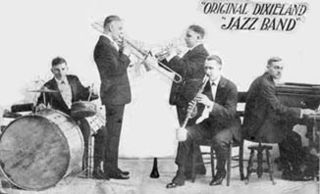
This is a list of notable events in music that took place in the year 1917.
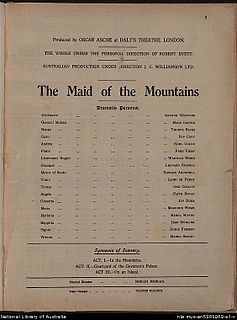
The Maid of the Mountains, called in its original score a musical play, is an operetta or "Edwardian" musical comedy in three acts. The music was by Harold Fraser-Simson, with additional music by James W. Tate, lyrics by Harry Graham and additional lyrics by Frank Clifford Harris and Valentine, and the book was written by Frederick Lonsdale, best known for his later society comedies such as On Approval. After an initial try-out at the Prince's Theatre in Manchester on 23 December 1916, the show was rewritten and opened at Daly's Theatre in London on 10 February 1917.
A revue is a type of multi-act popular theatrical entertainment that combines music, dance, and sketches. The revue has its roots in 19th century popular entertainment and melodrama but grew into a substantial cultural presence of its own during its golden years from 1916 to 1932. Though most famous for their visual spectacle, revues frequently satirized contemporary figures, news or literature. Similar to the related subforms of operetta and musical theatre, the revue art form brings together music, dance and sketches to create a compelling show. In contrast to these, however, revue does not have an overarching storyline. Rather, a general theme serves as the motto for a loosely-related series of acts that alternate between solo performances and dance ensembles.
This is a selected list of the longest-running musical theatre productions in history divided into two sections. The first section lists all Broadway and West End productions of musicals that have exceeded 2,500 performances, in order of greatest number of performances in either market. The second section lists, in alphabetical order, musicals that have broken historical long run records for musical theatre on Broadway, in the West End or Off-Broadway, since 1866, in alphabetical order.

Chu Chin Chow is a musical comedy written, produced and directed by Oscar Asche, with music by Frederic Norton, based on the story of Ali Baba and the 40 Thieves. The piece premièred at His Majesty's Theatre in London on 3 August 1916 and ran for five years and a total of 2,238 performances, an astonishing record that stood for nearly forty years until Salad Days. The show's first American production in New York, with additional lyrics by Arthur Anderson, played for 208 performances in 1917–1918, starring Tyrone Power. It subsequently had successful seasons elsewhere in America and Australia, including in 1919, 1920, 1921 and 1922.

The Bing Boys Are Here, styled "A Picture of London Life, in a Prologue and Six Panels," is the first of a series of revues which played at the Alhambra Theatre, London during the last two years of World War I. The series included The Bing Boys on Broadway and The Bing Girls are There. The music for them was written by Nat D. Ayer with lyrics by Clifford Grey, who also contributed to Yes, Uncle!, and the text was by George Grossmith, Jr. and Fred Thompson based on Rip and Bousquet's Le Fils Touffe. Other material was contributed by Eustace Ponsonby, Philip Braham and Ivor Novello.

Daphne Pollard was an Australian-born vaudeville performer and dancer, active on stage and later in US films, mostly short comedies.

John Stange(r) Heiss Oscar Asche, better known as Oscar Asche, was an Australian actor, director, and writer, best known for having written, directed, and acted in the record-breaking musical Chu Chin Chow, both on stage and film, and for acting in, directing, or producing many Shakespeare plays and successful musicals.
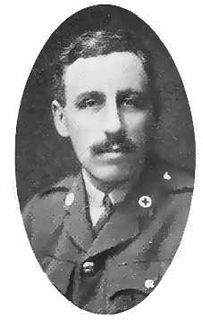
Harold Fraser-Simson was an English composer of light music, including songs and the scores to musical comedies. His most famous musical was the World War I hit The Maid of the Mountains, and he later set numerous children's poems to music, especially those of A. A. Milne.

Sir George Edward Wade, CBE, known professionally as George Robey, was an English comedian, singer and actor in musical theatre, who became known as one of the greatest music hall performers of the late 19th and early 20th centuries. As a comedian, he mixed everyday situations and observations with comic absurdity. Apart from his music hall acts, he was a popular Christmas pantomime performer in the English provinces, where he excelled in the dame roles. He scored notable successes in musical revues during and after the First World War, particularly with the song "If You Were the Only Girl ", which he performed with Violet Loraine in the revue The Bing Boys Are Here (1916). One of his best-known original characters in his six-decade long career was the Prime Minister of Mirth.

The Happy Day is a musical comedy in two acts by Seymour Hicks, with music by Sidney Jones and Paul Rubens, and lyrics by Adrian Ross and Rubens. It was produced by George Edwardes's company and was directed by Evett. The story concerns a royal couple who dislike each other but ultimately fall in love. A masquerade scene provides opportunities for mistaken identity.
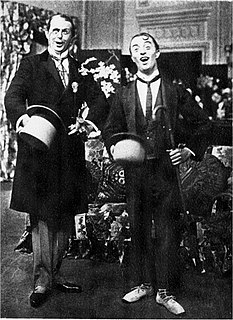
Theodore & Co is an English musical comedy in two acts with a book by H. M. Harwood and George Grossmith Jr. based on the French comedy Théodore et Cie by Paul Armont and Nicolas Nancey, with music by Ivor Novello and Jerome Kern and lyrics by Adrian Ross and Clifford Grey. It was produced by Grossmith and Edward Laurillard and directed by Austen Hurgon, opening at the Gaiety Theatre on 19 September 1916 and running for 503 performances. It starred Grossmith, Fred Leslie and Leslie Henson.

Yes, Uncle! is a musical comedy by Austen Hurgon and George Arthurs, with music by Nat D. Ayer and lyrics by Clifford Grey. The story is based on the farce Le truc du Brésilien by Nicolas Nancey and Paul Armont, and the musical takes its title from the catch-phrase used by Bobby Summers and Mabel Mannering, addressing Uncle Brabazon Hollybone. It was produced by George Grossmith, Jr. and Edward Laurillard and opened at the Prince of Wales Theatre in London on 16 December 1917 and ran for a very successful 626 performances. The piece starred Fred Leslie as G.B. Stark, Margaret Bannerman as Joan and Leslie Henson as Bobby Summers. Later, Madge Elliott and Cyril Ritchard starred in the musical.

Edwardian musical comedy was a form of British musical theatre that extended beyond the reign of King Edward VII in both directions, beginning in the early 1890s, when the Gilbert and Sullivan operas' dominance had ended, until the rise of the American musicals by Jerome Kern, Rodgers and Hart, George Gershwin and Cole Porter following the First World War.

George Michael Cohan was an American entertainer, playwright, composer, lyricist, actor, singer, dancer and theatrical producer.

Chu-Chin-Chow is a 1923 British-German silent adventure film directed by Herbert Wilcox and starring Betty Blythe, Herbert Langley and Randle Ayrton.

Vera Pearce was an Australian stage and film actress. Her lengthy career was carried out in both her home country and in England.

Joy Bells was a revue staged at the London Hippodrome at the end of World War I. It was devised by Albert de Courville, with music and lyrics by H. G. Pether, Rupert Hazell, Oliver Wallace, Harold Weeks and others. The revue opened on 25 March 1919, starring George Robey, Fred Allandale, Phyllis Bedells, Anita Elson, Leon Errol, Shirley Kellogg and Daphne Pollard. It ran for 723 performances.
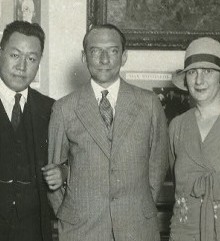
F. Ray Comstock was an American theatrical producer and theater operator. He pioneered the intimate musical comedy, staging several successful comedies at his Princess Theatre in Manhattan. He also produced spectacular musicals, variety shows and serious plays by authors such as Henrik Ibsen and Maxim Gorky.
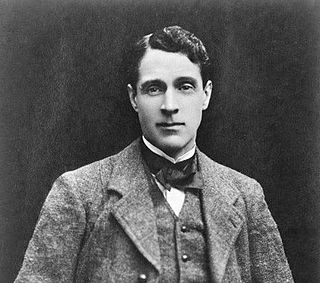
Alfred Leslie Lester was an English actor and comedian. Born into a theatrical family, he learnt his craft touring in melodramas, as a young man, but made his reputation as a comedian in musical comedy, music hall and, later, revue.

















